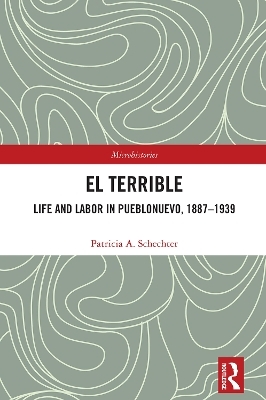
El Terrible: Life and Labor in Pueblonuevo, 1887-1939
Seiten
2024
Routledge (Verlag)
978-1-032-32275-9 (ISBN)
Routledge (Verlag)
978-1-032-32275-9 (ISBN)
This book is a biography of Pueblonuevo del Terrible, a mining town located in Andalusia, Spain. Based on previously unexamined sources, the study paints a fresh portrait of industrial workers and their families in Córdoba province, enriching our understanding of this mostly agricultural region.
Previous studies of laboring communities in Spain have identified radical workers, miners among them, as a destabilizing element due to their insurgent protest activity, including lethal violence. This study, by contrast, describes both worker activism and cross-class organizing as constructive, not destructive, and aimed at integration into Spanish society. Economically, the mining zone was dominated by a French company in the Rothschild portfolio. But by running their own city, waging peaceful labor strikes, raising a church, building housing, and honoring their dead, residents turned a quasi-colonial outpost into a pueblo worth defending, and they rallied in defense of the Republic at the outbreak of the Spanish Civil War. In the making of Pueblonuevo del Terrible, Spanish men and women contended with the perils of mine work, the jolts of industrial capitalism, creeping fascism, and civil war.
As such, this book tells a village-scale story of global events that defined the twentieth century.
Previous studies of laboring communities in Spain have identified radical workers, miners among them, as a destabilizing element due to their insurgent protest activity, including lethal violence. This study, by contrast, describes both worker activism and cross-class organizing as constructive, not destructive, and aimed at integration into Spanish society. Economically, the mining zone was dominated by a French company in the Rothschild portfolio. But by running their own city, waging peaceful labor strikes, raising a church, building housing, and honoring their dead, residents turned a quasi-colonial outpost into a pueblo worth defending, and they rallied in defense of the Republic at the outbreak of the Spanish Civil War. In the making of Pueblonuevo del Terrible, Spanish men and women contended with the perils of mine work, the jolts of industrial capitalism, creeping fascism, and civil war.
As such, this book tells a village-scale story of global events that defined the twentieth century.
Patricia A. Schechter teaches history at Portland State University in Oregon, U.S.A. She is the author of Ida B. Wells-Barnett and American Reform, 1880-1930, which won the Keller-Sierra Book Prize. Her other books and public history projects have been recognized for their excellence by ACRL Choice and the Oral History Association, among others.
Prologue: The Myth of Terrible 1. An Embattled Polity 2. Common Ground, Sacred Ground 3. Building Santa Barbara 4. El Dos de Abril 5. The Politics of Wrongdoing 6. Making and Unmaking Place Epilogue: A Theatrics of Death
| Erscheinungsdatum | 10.07.2024 |
|---|---|
| Reihe/Serie | Microhistories |
| Zusatzinfo | 1 Tables, black and white; 6 Line drawings, black and white; 16 Halftones, black and white; 22 Illustrations, black and white |
| Verlagsort | London |
| Sprache | englisch |
| Maße | 156 x 234 mm |
| Gewicht | 544 g |
| Themenwelt | Geschichte ► Allgemeine Geschichte ► Neuzeit (bis 1918) |
| Geisteswissenschaften ► Geschichte ► Regional- / Ländergeschichte | |
| Technik ► Bergbau | |
| ISBN-10 | 1-032-32275-6 / 1032322756 |
| ISBN-13 | 978-1-032-32275-9 / 9781032322759 |
| Zustand | Neuware |
| Haben Sie eine Frage zum Produkt? |
Mehr entdecken
aus dem Bereich
aus dem Bereich
Europa 1848/49 und der Kampf für eine neue Welt
Buch | Hardcover (2023)
DVA (Verlag)
48,00 €
Giordano Bruno - ein ketzerisches Leben
Buch | Hardcover (2024)
C.H.Beck (Verlag)
29,90 €


